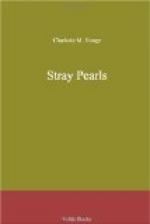The large salon, hung and draped with blue velvet, divided by lines of gold, was full of people ranged in a circle, listening eagerly to the recital of poem by the author, an Abbe, who stood in the midst, declaiming each couplet with emphasis, and keeping time with his foot, while he made gestures with his uplifted hand. Indeed, I thought at first he was in a furious passion and was going to knock someone down, till I saw calmly everyone sat; and then again I fancied we had come to a theatre by mistake; but happily I did not speak, and, without interrupting the declamation, chairs were given us, and exchanging a mute salutation with a lady of a noble cast of beauty, who guided us to seats, we quietly took our places. She was Julie d’Argennes, the daughter of Madame de Rambouillet. A gentlemen followed her closely, the Duke of Montausier, who adored her, but whom she could not yet decide on accepting.
I found it difficult to fit from laughing as the gestures of the Abbe, especially when I thought of my brother and how they would mock them; but I knew that this would be unpardonable bad taste, and as I had come in too late to have the clue to the discourse, I amused myself with looking about me.
Perhaps the most striking figure was that of the hostess, with her stately figure, and face, not only full of intellect, but of something that went far beyond it, and came out of some other higher world, to which she was trying to raise this one.
Next I observed a lady, no longer in her first youth, but still wonderfully fair and graceful. She was enthroned in a large arm-chair, and on a stool beside her sat her daughter, a girl of my own age, the most lovely creature I had ever seen, with a profusion of light flaxen hair, and deep blue eyes, and one moment full of grave thought, at another of merry mischief. A young sat by, whose cast of features reminded me of the Prince of Wales, but his nose was more aquiline, his dark blue eyes far more intensely bright and flashing, and whereas Prince Charles would have made fun of all the flourishes of our poet, they seemed to inspire in this youth an ardour he could barely restrain, and when there was something vehement about Mon epee et ma patrie he laid his hand on his sword, and his eyes lit up, so that he reminded me of a young eagle.
This was the Princess of Conde, who in the pride of her youthful beauty had been the last flame of Henri IV., who had almost begun a war on her account; this was her lovely daughter, Mademoiselle de Bourbon, and her sons, the brave Duke of Enghien, with his deformed brother, the Prince of Conti.
When the recital was over, there was a general outburst of applause, in which M. de Nidemerle joined heartily. Madame de Rambouillet gave her meed of approbation, but her daughter, Mademoiselle d’ Argennes, took exception at the use of the word chevaucher, for to ride, both as being obsolete, and being formed from the name of a single animal, instead of regularly derived from a Latin verb.




